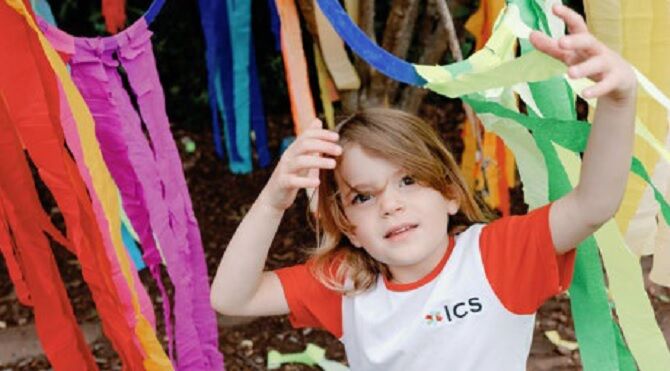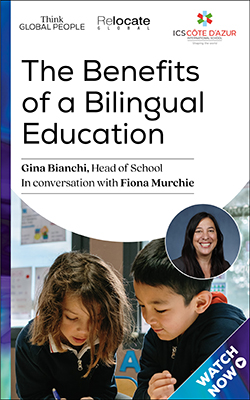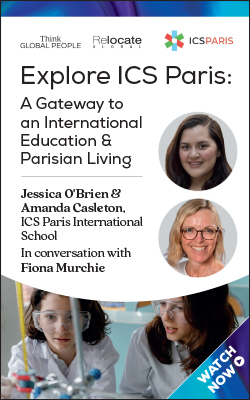Focus on France: an international education
International education in France is thriving with increased demand in the South and a range of international schools combining academic excellence with bilingualism and a strong focus on student wellbeing, writes Sally Robinson.

Student from ICS Nice
This article is taken from the Summer 2024 issue of
Think Global People magazine
Click on the cover to access the digital edition.How buoyant is the international schools market?
France has 152 international schools and seen 3.4–5 per cent year-on-year growth, according to ISC Research.“We have a lot of interest across all our schools in the region,” says Veronique Martinet, director of admissions for Globeducate France. “France remains a top destination for expatriate families and is also desirable to Americans, British (despite Brexit), Scandinavians and Russophone populations.“French families looking for a quality anglophone education and a different approach to the traditional French teaching style are also attracted to international schools. The French public education system is under pressure to catch up with a rapidly evolving, globalised world and the international schools´ market is seen as modern, hands-on and dynamic in comparison,” says Martinet. “Our schools are ahead of the curve with sustainability education, bilingualism, AI, coding and robotics and the emphasis on emotional wellbeing.”The group’s schools in the South of France are popular with expat families who work in luxury sectors or are digital nomads. In response to increased demand Mougins British International School on the Cote d’Azur is introducing several new middle-school classes for the upcoming academic year. “Typically there is a waitlist for years 7 and 8 so this allows more families to join us in September,” says James Wellings, head of school. The International Bilingual School of Provence is also adding new middle-school classes for grades 6–8 from September at its IBS West Campus, which is between Aix-en-Provence and Éguilles.There is also increased capacity for international students in three new ‘lycées international’ in the Paris area: the Lycée Lucie Aubrac de Courbevoie in the La Defense business district; the Lycée International de Palaiseau Paris-Saclay; and the Lycée International de Vincennes. They are designed to provide education for expats following the government’s bid to attract new business post-Brexit.
What has changed since the Covid pandemic?
“We have seen some really interesting shifts since the pandemic,” says Mougins’ head, James Wellings. “More French families have moved away from big cities to areas with more open space. Internationally, we have had more Scandinavian families, but British movement has been checked by Brexit – it is possible to live here as an expat, but it is a little more difficult than it used to be.”Mirroring the global trend, France has seen a decrease in corporate relocations post-covid. “There has been an increase in private relocations though,” says Kattin Lopez, education consultant at Your Friend in Paris. “More digital nomad families are moving to France for a few years with their children.”Not surprisingly, there are fewer British applying for visas. Residency permits for British nationals spiked in 2021, when over 99,000 were issued following Brexit compared with 8,700 in 2023. Americans are now the largest group being given residency cards, excluding people from North Africa. The number of Americans moving to France has tripled since the pandemic and many American-Franco families are choosing to live in France rather than the US.How valuable is a bilingual education?
Extremely, says Gina Bianchi, head of school at ICS Cote d’Azur, a bilingual primary school offering the IB PYP programme: “There are strong academic outcomes for bilingual students. They outperform monolingual students over and over, including in maths and literacy.”There is increasing evidence of the benefits of learning a language. “There are so many cognitive advantages: bilingual students can often focus better, are better at multitasking, more flexible with their thinking, more creative and empathetic and can address problems in different ways, which is an important skill.”When students learn multiple languages they also have the opportunity to choose the country where they go to university. “Around 64% of jobs in France seek people with a good level of English, but only about 25% of the population currently have that,” says Bianchi.There are two main approaches to bilingual education. These are referred to as the 90:10 and 50:50 models. The former involves 90% of instruction in the first year or two in the target language and 10% in English. At each grade, the amount of English rises by 10% until the ratio is evenly divided. In the 50:50 model, both languages are used for the same amount of time.“We use the 50:50 model and have separate French and English teachers. Our students alternate all lessons in French one day and English the next, right down to specialist subjects like sports and music,” says Bianchi.In France, public schools and private schools that are under contract with the State can offer up to 25% of classes in English, but private schools can offer a true bilingual education.ICS Paris teaches the IB curriculum and the language of instruction is English, however, being a Bilingual Multilingual Learners Smart School they provide support for French, Japanese, Korean and Spanish language as well.Hattemer Bilingue, a prestigious, private bilingual school established in 1885, has two schools in the 8th and 16th arrondissements. Classes are equally divided between English and French in kindergarten. In elementary, pupils are taught in English for 1h30 per day when they are introduced to different disciplines. For example, the school’s year 5 and 6 pupils have geography and science classes in English.A bilingual education is also at the heart of Ecole Internationale Bilingue (EIB). Its six private schools in Paris include EIB Grenelle for nursery and primary (which opened in 2021 in the 7th arrondissement close to Les Invalides), and EIB de la Jonchere for nursery, primary and middle school students set on a leafy campus 30 minutes from central Paris. Both follow the French National Curriculum incorporating daily English lessons from the age of three. “We use the French National Curriculum because it provides a structured framework. Students spend 50% of their school time in English, preparing them for international exams like the Cambridge Young Learners English exam,” says the school’s Grace de Miramon.
Which is the most popular curriculum - the French Baccalaureate, the IB or the British?
According to ISC Research, the IB is the most popular exit exam in international schools in France, although A levels are still highly regarded. “The IB is becoming very popular in France, particularly among international schools,” says Mel Curtis, head of the International School of Nice, which offers a K–12 IB curriculum. “Its global recognition and holistic approach present an attractive alternative to the traditional French Baccalaureate.”“The IB emphasises holistic development, interdisciplinary learning and multilingualism. In contrast with the French Bac, it provides a balanced education across disciplines, fostering research skills and creativity.”Some schools, including Ermitage International, offer both the French Baccalaureate Bilingual programme and the IB. “They both have their advantages, but the educational approach is entirely different so students can choose the type of learning that works best for them,” says the school’s Marketing Manager, Amélie Griel-Chaix. The choice also depends on where they plan to continue their studies. “The IB is recognised worldwide, which is not always the case with the French Baccalaureate.”At Globeducate, which has ten schools following an adapted British curriculum, A levels are still well recognised. “The IB remains less well-known than the British system when we speak to families, but the more they learn about it, the more they find its broad approach very attractive,” says Véronique Martinet, Globeducate France’s director of admissions. For families that relocate with older children, the French Bac can also be harder to access if families aren't familiar with the French language, meaning it is often a less popular choice.
Should expats consider a local school?
In short, maybe at primary level. The French system’s ‘écoles publiques’ offer free secular co-ed education from pre-school to senior school and follow the national curriculum set by the Ministry of Education. These schools are usually characterised by conventional teaching methods and have high academic standards. Sports and creative activities are not usually included in the curriculum.There is also provision within the French state system for international students who are taught parallel to standard classes in their own language in a ‘lycée international’, with an inclusive programme to help non-French speakers.“We mainly deal with British and American families and around 20–30% of them choose to go to local state schools, especially when they relocate outside Paris,” says relocation consultant, Kattin Lopez. “When the children are young, many families decide to go to local state schools, but less often when the children are older. At a secondary level, students with no previous French education would struggle.”Expat families are more likely to choose one of the country-specific international schools in France, including English, American, German, Spanish and Japanese. Fees are higher, but they offer transferable curriculums and there are no language difficulties.How well are SEND students looked after in France?
Support varies greatly, according to Jessica Lament, a Paris-based education consultant and inclusion specialist and vice president of the SPRINT network, a group of anglophone professionals in France who work with SEND students.Public schools share a psychologist who can come to support challenges. “They are often overwhelmed with caseloads and don't see children regularly, but rather as a one-off when needed,” says Lament. “For regular support, parents need to seek help outside of school. Most teachers are not trained to support children with challenges.”In state schools there are specialised classrooms in elementary and middle schools where trained teachers provide support. Students also have opportunities to be integrated into school life. International schools vary greatly in what they offer. Some have full learning support departments and others do not offer any specific support and may even screen students, subtly or not, who apply with educational needs.If families are looking for English services then they will have to go outside the public French network. Different non-profit associations can offer support, such as SPRINT, which has a directory of professionals in different specialties. Many therapists have waitlists, so reach out to them as soon as possible.Parents will need to talk to schools directly to determine how well-adapted they are for their child. Ask about which professionals they have, how support is monitored and if they allow external professionals to come into school.Read Related Articles:
- Exploring the English National Curriculum on the French Riviera
- The Benefits of a Bilingual Education
- Education in France
What are the options for boarding?
Boarding is a popular option in France, especially for French families that want to send their children to a particular school, or for students combining high-level sports and studies. Over 2,000 schools offer some sort of boarding, but the schools are very different from the traditional British boarding environment, lacking the facilities and comfortable standards of accommodation.More exclusive private boarding schools include Ecole Des Roches in Normandy, IBS of Provence and Ermitage International in Maisons-Laffitte, a charming peaceful town near Paris. Ermitage offers boarding to students from ages 11–18 and has just completed a new boarding house. “In recent years, the number of boarders has increased slightly and we are usually at or near capacity,” says the school’s Amelie Griel-Chaix.How important is Early Years education?
Early years is increasingly important in France. It is mandatory for children over the age of three to go to nursery school for three years before primary school. Most children attend four days a week from 8.30am–4.30pm. State nursery schools are free, but there is also a good choice of private schools and nurseries, many of them bilingual.Mougins British International school follows the UK’s Early Years Foundation Stage (EYFS), which focuses on developing language, numeracy and literacy through play. “We use a real-world, play-based scenario, which is widely recognised as best practice for early years children, so the children are not sitting down at desks,” says the school’s head.At Hattemer Bilingue, early years education is crucial, beginning with ‘école maternelle’ at age three, where a structured curriculum supports the development of social, cognitive and motor skills. The school’s three kindergarten classes follow a bilingual curriculum, with 50% of instruction in English and 50% in French to ensure pupils master fundamental skills in both languages.Established in 1885, Hattemer Bilingue uses a distinct teaching methodology with small class sizes and an emphasis on fundamental disciplines (French, mathematics, English) and a broad range of subjects (history, geography, sciences). Proven teaching methods include syllabic reading, daily dictations, mental arithmetic and English instruction by native speakers. The weekly assessment ("Grand Cours") tests both written and oral skills, involving parents in the learning process.What about STEAM provision?
As in other countries, the study of STEAM (science, technology, engineering, art and maths) is increasingly important in France. Designed to connect different subjects together in a way that relates to both the real and business world, STEAM education shows the relationship between subjects and real life, increasing multidisciplinary problem-solving skills.All Globeducate’s 60 bilingual and international schools have an integrated STEAM agenda and embed creativity in all science, technology, engineering, arts and maths lessons and activities. The idea is students learn how to make connections, organise their ideas, be creative and make decisions and work together across different disciplines. Importantly, they learn how to transfer what they learn in one curriculum area to others and to real-life situations.Mougins British International school, located in the Sophia Antipolis Technology Park between Nice and Cannes (known as the ‘Silicon Valley’ of the South of France), places an increasing emphasis on STEAM. “In addition to incorporating STEAM into normal lessons, our clubs and societies and our Thrive programme provide students with the opportunity to do lots of robotics,” says head of school, James Wellings. “One local company donated a state-of-the-art robotic arm, which can be programmed to do high precision-level work, and our A level students in physics can get involved in programming it. We also have coding and computers available to all our primary students.”The nearby ICS Cote d’Azur, a bilingual early years and primary school offering the IB Primary Years Programme (PYP), also takes advantage of its position in the technology park: “It is great when we are working on interdisciplinary units for trips to expose our students,” says Bianchi. The school is beginning to integrate robotics and coding into the curriculum and has a dedicated STEAM education hub, which opened in 2021, at the heart of the school housing its LEGO® Education SPIKE™ Prime and WeDo 2.0 Robotic kits, a 3D printer, iPads, science equipment, art materials and a green screen so that children can get creative with their presentations. “I always say STEAM happens everywhere in the school,” says its head, Gina Bianchi. The school also has a STEAM club from primary year 3, a robotics club that takes part in the annual Robotics Challenge in Paris, and is an Apple Distinguished School recognised for continuous innovation in learning and teaching.
Do French schools have a good track record on student wellbeing?
As in other countries, the pandemic has had a negative impact on the mental health of teenagers and young adults in France. In 2022–23, the French Education Minister mandated that wellbeing must be a priority in schools.The International School of Nice had already intensified its own initiatives. “Student wellbeing is paramount to our mission and philosophy. We've appointed a director of pastoral and wellbeing and a full-time counsellor to address mental wellness. As well, our ‘essentials’ programme runs sessions on stress management, relaxation techniques and empathy development for students,” says Mel Curtis, head of school.Relocation consultant Kattin Lopez has also seen an increase in the number of schools moving towards a more soft-skills-oriented approach, such as Montessori, with children at the centre of the learning process. “Schools are exploring methods that take care of the children's wellbeing through nature and to help them flourish through kindness rather than discipline,” she says.The curriculum at Mougins British International School has a ‘Positive Education’ component, a psychology-based programme from Australia designed to help children acquire the knowledge, understanding and skills to successfully manage their lives. “We put a big emphasis on helping our students feel safe and happy in our environment and making sure they can communicate effectively, be resilient and take care of their own wellbeing. We want students to leave here being able to adapt to new situations,” says Mougins’ head, James Wellings.Read about award-winning global mobility, leadership and education in the upcoming Summer issue of Think Global People magazine, with the teams and organisations being celebrated in the Relocate Think Global People Awards 2024. Secure your copy here.

Have you heard about our Think Global People community?

Find out more about the Think Global People and Think Women community and events.

Subscribe to Relocate Extra, our monthly newsletter, to get all the latest international assignments and global mobility news.Relocate’s new Global Mobility Toolkit provides free information, practical advice and support for HR, global mobility managers and global teams operating overseas.
©2025 Re:locate magazine, published by Profile Locations, Spray Hill, Hastings Road, Lamberhurst, Kent TN3 8JB. All rights reserved. This publication (or any part thereof) may not be reproduced in any form without the prior written permission of Profile Locations. Profile Locations accepts no liability for the accuracy of the contents or any opinions expressed herein.





































